- Home
- Don DeLillo
Cosmopolis
Cosmopolis Read online
From Publishers Weekly
DeLillo skates through a day in the life of a brilliant and precocious New Economy billionaire in this monotone 13th novel, a study in big money and affectlessness. As one character remarks, 28-year-old Eric Packer "wants to be one civilization ahead of this one." But on an April day in the year 2000, Eric's fortune and life fall apart. The story tracks him as he traverses Manhattan in his stretch limo. His goal: a haircut at Anthony's, his father's old barber. But on this day his driver has to navigate a presidential visit, an attack by anarchists and a rapper's funeral. Meanwhile, the yen is mounting, destroying Eric's bet against it. The catastrophe liberates Eric's destructive instinct-he shoots another character and increases his bet. Mostly, the action consists of sequences in the back of the limo (where he stages meetings with his doctor, various corporate officers and a New Economy guru) interrupted by various pit stops. He lunches with his wife of 22 days, Elise Shifrin. He has sex with two women, his art consultant and a bodyguard. He is hit in the face with a pie by a protester. He knows he is being stalked, and the novel stages a final convergence between the ex-tycoon and his stalker. DeLillo practically invented the predominant vernacular of the late '90s (the irony, the close reading of consumer goods, the mock complexity of technobabble) in White Noise, but he seems surprisingly disengaged here. His spotlighted New Economy icon, Eric, doesn't work, either as a genius financier (he is all about gadgetry, not exchange-there's no love of the deal in his "frozen heart") or a thinker. The threats posed by the contingencies that he faces cannot lever him out of his recalcitrant one-dimensionality. DeLillo is surely an American master, but this time out, he is doodling.
From Library Journal
Unlike his sprawling masterpiece, Underworld, DeLillo's 13th novel is short and tightly focused, indeed almost claustrophobic. Most of the action takes place inside a "prousted" (cork-lined) stretch limo, as the reclusive financial wizard Eric Packer is chauffeured across Manhattan for a haircut. Thanks to a presidential visit, antiglobalization demonstrations, and a celebrity funeral, this journey takes up most of the day. Stuck in traffic, Packer anxiously monitors the value of the yen on the limo's computer. Using the car as his office, he summons advisors from nearby shops and restaurants. His physician gives him a rubber-gloved physical exam in the back seat as Packer discusses imminent financial ruin with his broker and angry crowds block the streets. This work most closely resembles The Body Artist in its brevity and straightforward narrative flow. However, the earlier novel was written in an uncharacteristically warm, poetic style, promising a new direction for this important writer, while Cosmopolis reverts to the standard DeLillo boilerplate, perceptive and funny but also brittle and cold. This, coupled with the book's dated 1990s sensibility, makes Cosmopolis a step backward rather than an artistic advance.
TO PAUL AUSTER
A rat became the unit of currency
-Zbigniew Herbert
Contents
IN THE YEAR 2000
PART ONE
1
2
PART TWO
3
4
This book is a work of fiction. Names, characters, places, and incidents either are products of the author's imagination or are used fictitiously. Any resemblance to actual events or locales or persons, living or dead, is entirely coincidental.
Copyright © 2003 by Don DeLillo
IN THE YEAR 2000
A Day in April
PART ONE
1
Sleep failed him more often now, not once or twice a week but four times, five. What did he do when this happened? He did not take long walks into the scrolling dawn. There was no friend he loved enough to harrow with a call. What was there to say? It was a matter of silences, not words.
He tried to read his way into sleep but only grew more wakeful. He read science and poetry. He liked spare poems sited minutely in white space, ranks of alphabetic strokes burnt into paper. Poems made him conscious of his breathing. A poem bared the moment to things he was not normally prepared to notice. This was the nuance of every poem, at least for him, at night, these long weeks, one breath after another, in the rotating room at the top of the triplex.
He tried to sleep standing up one night, in his meditation cell, but wasn't nearly adept enough, monk enough to manage this. He bypassed sleep and rounded into counterpoise, a moonless calm in which every force is balanced by another. This was the briefest of easings, a small pause in the stir of restless identities.
There was no answer to the question. He tried sedatives and hypnotics but they made him dependent, sending him inward in tight spirals. Every act he performed was self-haunted and synthetic. The palest thought carried an anxious shadow. What did he do? He did not consult an analyst in a tall leather chair. Freud is finished, Einstein's next. He was reading the Special Theory tonight, in English and German, but put the book aside, finally, and lay completely still, trying to summon the will to speak the single word that would turn off the lights. Nothing existed around him. There was only the noise in his head, the mind in time.
When he died he would not end. The world would end.
He stood at the window and watched the great day dawn. The view was across bridges, narrows and sounds and out past the boroughs and toothpaste suburbs into measures of landmass and sky that could only be called the deep distance. He didn't know what he wanted. It was still nighttime down on the river, half night, and ashy vapors wavered above the smokestacks on the far bank. He imagined the whores were all fled from the lamplit corners by now, duck butts shaking, other kinds of archaic business just beginning to stir, produce trucks rolling out of the markets, news trucks out of the loading docks. The bread vans would be crossing the city and a few stray cars out of bedlam weaving down the avenues, speakers pumping heavy sound.
The noblest thing, a bridge across a river, with the sun beginning to roar behind it.
He watched a hundred gulls trail a wobbling scow downriver. They had large strong hearts. He knew this, disproportionate to body size. He'd been interested once and had mastered the teeming details of bird anatomy. Birds have hollow bones. He mastered the steepest matters in half an afternoon.
He didn't know what he wanted. Then he knew. He wanted to get a haircut.
He stood a while longer, watching a single gull lift and ripple in a furl of air, admiring the bird, thinking into it, trying to know the bird, feeling the sturdy earnest beat of its scavenger's ravenous heart.
He wore a suit and tie. A suit subdued the camber of his overdeveloped chest. He liked to work out at night, pulling weighted metal sleds, doing curls and bench presses in stoic repetitions that ate away the day's tumults and compulsions.
He walked through the apartment, forty-eight rooms. He did this when he felt hesitant and depressed, striding past the lap pool, the card parlor, the gymnasium, past the shark tank and screening room. He stopped at the borzoi pen and talked to his dogs. Then he went to the annex, where there were currencies to track and research reports to examine.
The yen rose overnight against expectations.
He went back up to the living quarters, walking slowly now, and paused in every room, absorbing what was there, deeply seeing, retaining every fleck of energy in rays and waves.
The art that hung was mainly color-field and geometric, large canvases that dominated rooms and placed a prayerful hush on the atrium, skylighted, with its high white paintings and trickle fountain. The atrium had the tension and suspense of a towering space that requires pious silence in order to be seen and experienced properly, the mosque of soft footfall and rock doves murmurous in the vaulting.
He liked paintings that his guests did not know how to look at. The white paintings were unknowable to many, knife-applied slabs of mucoid color. The wo
rk was all the more dangerous for not being new. There's no more danger in the new.
He rode to the marble lobby in the elevator that played Satie. His prostate was asymmetrical. He went outside and crossed the avenue, then turned and faced the building where he lived. He felt contiguous with it. It was eighty nine stories, a prime number, in an undistinguished sheath of hazy bronze glass. They shared an edge or boundary, skyscraper and man. It was nine hundred feet high, the tallest residential tower in the world, a commonplace oblong whose only statement was its size. It had the kind of banality that reveals itself over time as being truly brutal. He liked it for this reason. He liked to stand and look at it when he felt this way. He felt wary, drowsy and insubstantial.
The wind came cutting off the river. He took out his hand organizer and poked a note to himself about the anachronistic quality of the word skyscraper. No recent structure ought to bear this word. It belonged to the olden soul of awe, to the arrowed towers that were a narrative long before he was born.
The hand device itself was an object whose original culture had just about disappeared. He knew he'd have to junk it.
The tower gave him strength and depth. He knew what he wanted, a haircut, but stood a while longer in the soaring noise of the street and studied the mass and scale of the tower. The one virtue of its surface was to skim and bend the river light and mime the tides of open sky. There was an aura of texture and reflection. He scanned its length and felt connected to it, sharing the surface and the environment that came into contact with the surface, from both sides. A surface separates inside from out and belongs no less to one than the other. He'd thought about surfaces in the shower once.
He put on his sunglasses. Then he walked back across the avenue and approached the lines of white limousines. There were ten cars, five in a curbside row in front of the tower, on First Avenue, and five lined up on the cross street, facing west. The cars were identical at a glance. Some may have been a foot or two longer than others depending on details of the stretch work and the particular owner's requirements.
The drivers smoked and talked on the sidewalk, hatless in dark suits, sharing an alertness that would be evident only in retrospect when their eyes went hot in their heads and they shed their cigarettes and vacated their unstudied stances, having spotted the objects of their regard.
For now they talked, in accented voices, some of them, or first languages, others, and they waited for the investment banker, the land developer, the venture capitalist, for the software entrepreneur, the global overlord of satellite and cable, the discount broker, the beaked media chief, for the exiled head of state of some smashed landscape of famine and war.
In the park across the street there were stylized ironwork arbors and bronze fountains with iridescent pennies scattershot at the bottom. A man in women's clothing walked seven elegant dogs.
He liked the fact that the cars were indistinguishable from each other. He wanted such a car because he thought it was a platonic replica, weightless for all its size, less an object than an idea. But he knew this wasn't true. This was something he said for effect and he didn't believe it for an instant. He believed it for an instant but only just. He wanted the car because it was not only oversized but aggressively and contemptuously so, metastasizingly so, a tremendous mutant thing that stood astride every argument against it.
His chief of security liked the car for its anonymity.
Long white limousines had become the most unnoticed vehicles in the city. He was waiting on the sidewalk now, Torval, bald and no-necked, a man whose head seemed removable for maintenance.
"Where?" he said.
"I want a haircut."
"The president's in town."
"We don't care. We need a haircut. We need to go crosstown."
"You will hit traffic that speaks in quarter inches."
"Just so I know Which president are we talking about?"
" United States. Barriers will be set up," he said. "Entire streets deleted from the map."
"Show me my car," he told the man.
The driver held the door open, ready to jog around the rear of the car and down to his own door, thirty-five feet away. Where the file of white limousines ended, parallel to the entrance of the Japan Society, another line of cars commenced, the town cars, black or indigo, and the drivers waited for members of diplomatic missions, for the delegates, consuls and sunglassed attaches.
Torval sat with the driver up front, where there were dashboard computer screens and a night-vision display on the lower windshield, a product of the infrared camera situated in the grille.
Shiner was waiting inside the car, his chief of technology, small and boy-faced. He did not look at Shiner anymore. He hadn't looked in three years. Once you'd looked, there was nothing else to know.
You'd know his bone marrow in a beaker. He wore his faded shirt and jeans and sat in his
masturbatory crouch.
"What have we learned then?"
"Our system's secure. We're impenetrable. There's no rogue program," Shiner said.
"It would seem, however."
"Eric, no. We ran every test. Nobody's overloading the system or manipulating our sites."
"When did we do all this?"
"Yesterday. At the complex. Our rapid-response team. There's no vulnerable point of entry. Our insurer did a threat analysis. We're buffered from attack."
"Everywhere."
"Yes."
"Including the car."
"Including, absolutely, yes."
"My car. This car."
"Eric, yes, please."
"We've been together, you and I, since the little bitty start-up. I want you to tell me that you still have the stamina to do this job. The single-mindedness."
"This car. Your car."
"The relentless will. Because I keep hearing about our legend. We're all young and smart and were raised by wolves. But the phenomenon of reputation is a delicate thing. A person rises on a word and falls on a syllable. I know I'm asking the wrong man."
"What?"
"Where was the car last night after we ran our tests?"
"I don't know"
"Where do all these limos go at night?"
Shiner slumped hopelessly into the depths of this question.
"I know I'm changing the subject. I haven't been sleeping much. I look at books and drink brandy. But what happens to all the stretch limousines that prowl the throbbing city all day long? Where do they spend the night?"
The car ran into stalled traffic before it reached Second Avenue. He sat in the club chair at the rear of the cabin looking into the array of visual display units. There were medleys of data on every screen, all the flowing symbols and alpine charts, the polychrome numbers pulsing. He absorbed this material in a couple of long still seconds, ignoring the speech sounds that issued from lacquered heads. There was a microwave and a heart monitor. He looked at the spycam on a swivel and it looked back at him. He used to sit here in hand-held space but that was finished now The context was nearly touchless. He could talk most systems into operation or wave a hand at a screen and make it go blank.
A cab squeezed in alongside, the driver pressing his horn. This set off a hundred other horns.
Shiner stirred in the jump seat near the liquor cabinet, facing rearward. He was drinking fresh orange juice through a plastic straw that extended from the glass at an obtuse angle. He seemed to be whistling something into the shaft of the straw between intakes of liquid.
Eric said, "What?"
Shiner raised his head.
"Do you get the feeling sometimes that you don't know what's going on?" he said.
"Do I want to ask what you mean by that?"
Shiner spoke into his straw as if it were an onboard implement of transmission.
"All this optimism, all this booming and soaring. Things happen like bang. This and that simultaneous. I put out my hand and what do I feel? I know there's a thousand things you analyze every ten minutes. Patterns, ratios,
indexes, whole maps of information. I love information. This is our sweetness and light. It's a fuckall wonder. And we have meaning in the world. People eat and sleep in the shadow of what we do. But at the same time, what?"
There was a long pause. He looked at Shiner finally. What did he say to the man? He did not direct a remark that was hard and sharp. He said nothing at all in fact.
They sat in the swell of blowing horns. There was something about the noise that he did not choose to wish away. It was the tone of some fundamental ache, a lament so old it sounded aboriginal. He thought of men in shaggy bands bellowing ceremonially, social units established to kill and eat. Red meat. That was the call, the grievous need. The cooler carried beverages today. There was nothing solid for the microwave.
Shiner said, "Any special reason we're in the car instead of the office?"
"How do you know we're in the car instead of the office?"
"If I answer that question."
"Based on what premise?"
"I know I'll say something that's halfway clever but mostly shallow and probably inaccurate on some level. Then you'll pity me for having been born."
"We're in the car because I need a haircut."
"Have the barber go to the office. Get your haircut there. Or have the barber come to the car. Get your haircut and go to the office."
"A haircut has what. Associations. Calendar on the wall. Mirrors everywhere. There's no barber chair here. Nothing swivels but the spycam."
He shifted position in his chair and watched the surveillance camera adjust. His image used to be accessible nearly all the time, videostreamed worldwide from the car, the plane, the office and selected sites in his apartment. But there were security issues to address and now the camera operated on a closed circuit. A nurse and two armed guards were on constant watch at three monitors in a windowless room at the office. The word office was outdated now. It had zero saturation.

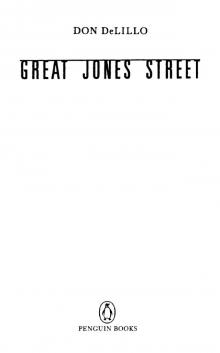 Great Jones Street (Contemporary American Fiction)
Great Jones Street (Contemporary American Fiction)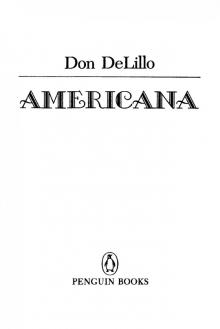 Americana
Americana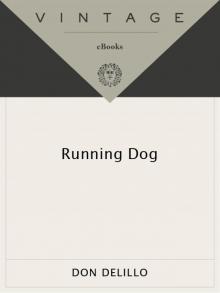 Running Dog
Running Dog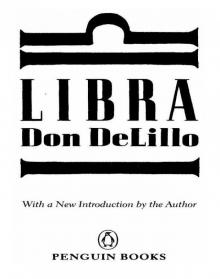 Libra
Libra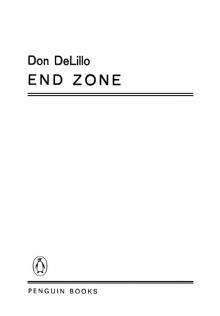 End Zone
End Zone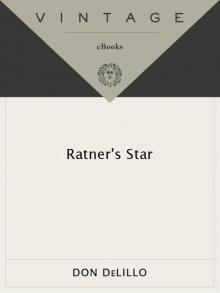 Ratner's Star
Ratner's Star Underworld
Underworld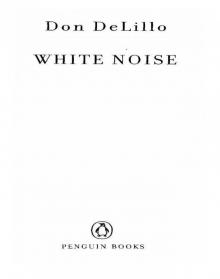 White Noise
White Noise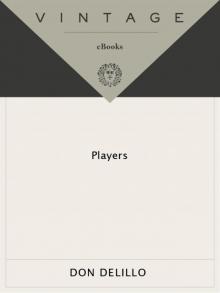 Players
Players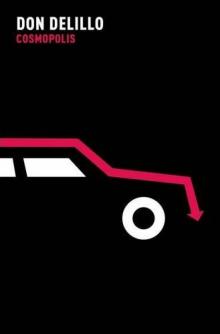 Cosmopolis
Cosmopolis The Silence
The Silence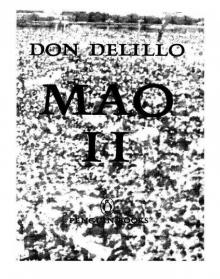 Mao II
Mao II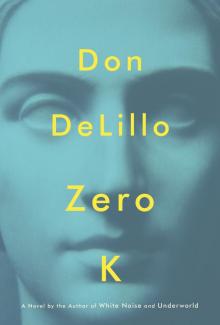 Zero K
Zero K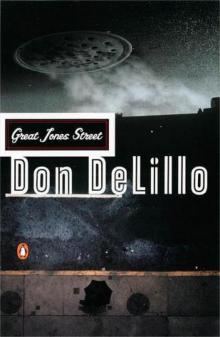 Great Jones Street
Great Jones Street The Angel Esmeralda
The Angel Esmeralda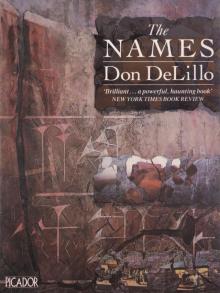 The Names
The Names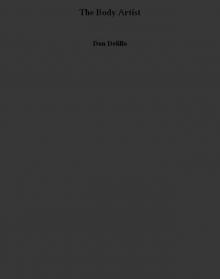 The Body Artist
The Body Artist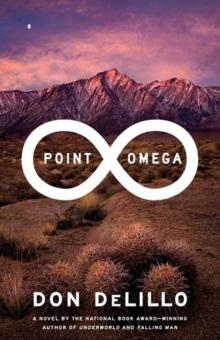 Point Omega
Point Omega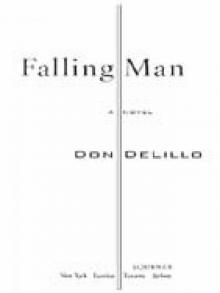 Falling Man
Falling Man